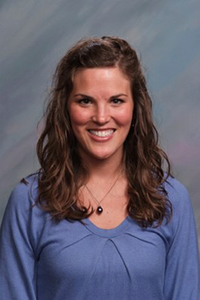
Dr. Emily Hawes is a clinical pharmacist practitioner, a designation by the North Carolina Boards of Medicine and Pharmacy conferring approval to provide collaborative drug therapy management under the direction of a licensed physician. She serves in this capacity at the University of North Carolina (UNC) Family Medicine Center in Chapel Hill, North Carolina, and she is currently a clinical assistant professor at the UNC School of Medicine. In 2006, Dr. Hawes earned her B.S. degree in education and, in 2010, her Pharm.D. degree, both from Samford University in Birmingham, Alabama. In 2011, she completed a PGY1 pharmacy practice residency and, the next year, completed a PGY2 pharmacotherapy residency—both earned at the University of North Carolina Hospitals and Clinics in Chapel Hill, North Carolina.
Dr. Hawes practices at the UNC Family Medicine Center, an ambulatory care site with a pharmacist-led pharmacotherapy clinic focusing on the management of chronic diseases such as anticoagulation, heart failure, hypertension, diabetes, asthma, chronic pain, and chronic obstructive pulmonary disease as well as medication reconciliation after hospital discharge during multidisciplinary visits. She also serves as a preceptor for pharmacy residents and students through the University of North Carolina Eshelman School of Pharmacy. She has the additional responsibilities of teaching Family Medicine medical residents, responding to drug information inquiries for the Family Medicine team, developing and evaluating medication-related policies and procedures, contributing to various quality improvement initiatives, and providing recommendations, counseling, and education to patients as needed. With respect to her research endeavors, Dr. Hawes was recently awarded a grant from the American College of Clinical Pharmacy for a prospective pharmacodynamic study evaluating peak and trough coagulation test results in patients taking therapeutic doses of rivaroxaban.
Dr. Hawes chose clinical pharmacy as a profession by seeking God’s particular place of service in her life. Throughout many years of living abroad and one experience after another, she felt her heart was turned to serve those who are physically hurting. One experience influencing her drive toward health care was during her visit to an isolated leper colony in northern India with her family. She met a woman in a mud hut whose hands were both covered in open sores and whose fingers had disintegrated; this woman suffered from leprosy. Without any fingers, she could only watch as her daughter cleaned the rice for supper. To move from place to place, she painfully shuffled her body along the dirt ground. The daughter explained that they been forced to abandon their old homes and permanently seclude themselves from the rest of society. She then asked, “But, Emily, have you come to help? Did you bring medicine? Can you cure my mother?” At this moment, Dr. Hawes realized she wanted to do more than just smile and empathize with others in agony. She wanted to provide a service to help physical suffering.
One of Dr. Hawes’ undergraduate professors encouraged her to explore the field of pharmacy. Positive experiences shadowing pharmacists inspired her to pursue this wonderful profession. During her first month of PGY1 residency while rotating with an exceptional pharmacist at UNC’s Family Medicine Center, she discovered the valuable role of a clinical pharmacist in the primary care setting. The passion to provide pharmacy services across diverse patient populations of all ages led her to pursue a PGY2 in pharmacotherapy, and she went on to serve as a pharmacist in the primary care setting at a great institution with extraordinary colleagues.
Dr. Hawes attributes mentorship as the single most important influence on her career. Several professors and preceptors at Samford and UNC significantly affected her professional development. This included contributing to her decision to pursue pharmacy, increasing her passion for the profession, and directing her to residency training, which led to a position in a primary care setting. The leadership of her mentors was exemplified in the ways they served, respected, listened, motivated, taught, and communicated to help learners realize their maximum potential. Leadership is all about influence and service through building relationships and taking the time to really learn about one’s background, goals, and motivations. Through the years, mentors have shown what it means to provide exceptional care to patients, continually self-evaluate, make evidence-based decisions, maintain a high standard of integrity and excellence, act professionally, serve selflessly, live in a balanced way, integrate with a multidisciplinary team, advocate for pharmacy, be a lifelong learner, count blessings, and accomplish responsibilities effectively and efficiently, among other traits. Even now, being mentored by outstanding pharmacists and other health care providers helps Dr. Hawes grow as a leader, practitioner, educator, and preceptor. It is out of gratitude for the many individuals who have invested in her that she is inspired to mentor others and help prepare the next generation of pharmacists.
People would be surprised to know that she met Princess Diana in Pakistan during elementary school, played the position of goalkeeper for her college soccer team, and went skydiving for her 1-year wedding anniversary.